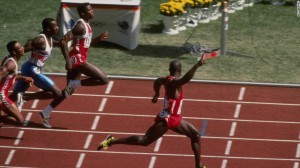Nice people don’t cheat… no they do, they just don’t get caught. We are all capable of unethical behaviour, we consider the profit it may bring, the possibility of being caught and the scale of possible punishment. We are more likely to cheat when we can benefit more from it, when there is no witnesses and the punishments are mild (Becker, 1968). Athletes go through the cost-benefit analysis of cheating by rationalization. And some believe the consequences, both organizational and to their own health, is lower than the performance benefit of doping.

In Sport only professional athletes cheat by using performance enhancing drugs, they are the only people with anything to gain? We criticize them and blame our growing cynicism with success in sport on professional athletes’ propensity to dope. But to feel that any sport is above or beyond doping is not only naive and gullible, it’s dangerous. Each sport relies on the moral compass of its athletes to determine their course, and historically athletes in all sports have not been the most trustworthy. So why would the GAA athletes be any different, is their moral guidance superior; are they immune from the temptations that athletes in other sports experience? Why is the governing body willing to keep positive tests under wraps to avoid potential scandals? Just like professional athletes amateurs are completely wrapped up in their competitive identity. And the reality is amateur athletes dope too. The danger is, that by choosing to brush even one failed test under the carpet, the sport has been irreversibly damaged. Whether it is an accidental failure or due to a systematic doping programme is irrelevant, the fact is that doping of any kind gives the recipient an unfair advantage over clean competitors. The sales of performance enhancing drugs are growing all over the world because it allows amateurs mimic the performances and physiques of their professional counterparts, and historically no sport has had a drugs problem until they end up with a bad one.
The best-known drugs for increasing strength and power are anabolic steroids, these compounds imitate the way testosterone works in the body, activating protein synthesis and building more muscle tissue. A course of steroids combined with training can translate to a 38% increase in strength in men, potentially more in women. Human growth hormone is another popular choice amongst dopers; this stimulates muscle growth and has been shown to increase sprinting speed by up to 4% (Meinhardt et al., 2010). To improve endurance the aim is to boost the oxygen-carrying capacity of the blood and athletes can get dramatic results from blood cell transfusions or taking erythropoietin (EPO) and can improve stamina by up to 34 % in some cases (Buick et al., 1980; Williams et al., 1981). Researchers in Germany discovered that 15% of three thousand triathletes (amateurs) surveyed admitted to brain doping – using prescription medicines that increase attention concentration, memory, cognition and overall mental performance. Taking drug products including amphetamines, or medicines like modafinil or methylphenidate to enhance the brain is more fashionable among amateur athletes than taking drugs to boost power, strength and endurance. In the same study 13% said they had taken drugs like EPO, steroids, or growth hormones (HGH) (Dietz et al., 2013). These drugs not only have a reputation for improving athletic performance but also have potentially dangerous side effects. Steroids can cause high blood pressure, thickening of the heart valves, decreased fertility and libido, and changes such as chest hair in women and shrunken testicles in men. And boosting the number of red blood cells thickens the blood, increasing the risk of having a stroke amongst other things.
Athletes, both professional and amateur, will always have the desire to push the edge whether that is for money, recognition or both. They must decide whether they are to compete honestly and safely but at a possible disadvantage. But anyone that has trained for a goal knows it is a test in the ability to persist and postpone the short-term satisfaction of stopping, in favour of achieving. In today’s fast paced world instant gratification is the norm, patience and hard work is undervalued and not tolerated. Sometimes in the effort to win at all costs even “nice” people ignore their moral compass and push beyond their natural limits to be “faster, higher, stronger”.
.
References
Becker GS. (1968). Crime and Punishment: An Economic Approach. Journal of Political Economy 76, 169-217.
Buick FJ, Gledhill N, Froese AB, Spriet L & Meyers EC. (1980). Effect of induced erythrocythemia on aerobic work capacity. Journal of Applied Physiology 48, 636-642.
Dietz P, Ulrich R, Dalaker R, Striegel H, Franke AG, Lieb K & Simon P. (2013). Associations between physical and cognitive doping–a cross-sectional study in 2.997 triathletes. PLoS One 8, e78702.
Meinhardt U, Nelson AE, Hansen JL, Birzniece V, Clifford D, Leung KC, Graham K & Ho KK. (2010). The effects of growth hormone on body composition and physical performance in recreational athletes: a randomized trial. Ann Intern Med 152, 568-577.
Williams MH, Wesseldine S, Somma T & Schuster R. (1981). The effect of induced erythrocythemia upon 5-mile treadmill run time. Med Sci Sports Exerc 13, 169-175.

Great article!!!! I agree with you